Many diseases exist in the United States. Some of these diseases can be quite a nuisance, while others can be outright dangerous. One disease that follows the latter is cancer.
Cancer is the second leading cause of death in the United States, accounting for nearly 1 in 4 deaths. Cancer mortality rates have been slowly decreasing during the past few years thanks to advances in screening and treatment, but it’s expected that about 600,000 Americans are expected to suffer from cancer this year.
Cancer incidence rates vary widely by race and ethnicity. For example, African Americans have the highest cancer incidence rates of any racial or ethnic group in the US, followed by whites, Hispanics, Asian/Pacific Islanders, and American Indians/Alaska Natives. These disparities are likely due to a combination of factors, including differences in access to quality healthcare and lifestyle factors such as diet and exercise.
With this in mind, there’s a chance that you or someone you know might have early stages of cancer. So here are ways you can deal with it early on.
Learn as much as you can
The more you know about cancer, the better equipped you’ll deal with it. Start by learning about the different types of cancer and their symptoms. This way, you’ll know what to look for if you or someone you know starts showing signs of the disease. You can also learn about risk factors, such as smoking, family history, and exposure to certain chemicals or radiation. The more you know about cancer, the better able you or your loved ones can be to prevent it or catch it early.
Get screened regularly
One of the best ways to deal with the early stages of cancer is to get screened regularly. Screenings can help catch cancer early when it’s most treatable. There are many different screenings available, so talk to your doctor about which ones are right for you. Depending on your age, health history, and family history, you may be at risk for different types of cancer.

Find a good medical team
If you or someone you know has cancer, it’s crucial to find a good medical team. This team should include a primary care doctor, as well as specialists such as an oncologist (a cancer doctor) and surgeon. This may even have a scalp medical professional for your hair if you get chemotherapy. This can help with your hair recovery right after your treatment is done. You should also consider working with a naturopathic doctor who can help you manage side effects and make sure you’re getting the nutrients you need.
Make lifestyle changes
If you or someone you know has cancer, lifestyle changes can be made to help improve the prognosis. These changes include quitting smoking, eating a healthy diet, getting regular exercise, and maintaining a healthy weight. Making these changes can help improve the outcome of cancer treatment and help lower the risk of cancer recurrence.
Develop a support system
Dealing with cancer can be overwhelming, so developing a support system is crucial. This could include family, friends, co-workers, and even strangers who have been through similar experiences. Many support groups are available for people with cancer and their loved ones. These groups can provide emotional and practical support.
Thankfully, support groups can also be found online right now. This can be a great way to find support without having to leave your home. This can also help you avoid the pandemic. You can find groups for people with cancer and their loved ones, as well as groups for specific types of cancer.
Be positive and hopeful
It’s important to remain positive and hopeful when dealing with cancer. This disease can be difficult, but there are many people who have beaten it. Remember that you are not alone in this fight. There are many resources available to help you through this journey.
Get financial assistance if needed
Dealing with cancer can be expensive. There are many costs associated with treatment, such as doctor’s visits, medication, and surgeries. There are also many costs that come with lifestyle changes, such as quitting smoking and eating a healthy diet. If you or someone you know is having trouble paying for treatment, there are many financial assistance programs available.
No matter what stage of cancer you or a loved one is in, these seven tips can help you deal with the disease. Cancer is a difficult journey, but you don’t have to go through it alone. There are many resources available to help you every step of the way. Make sure to leverage these resources to help you deal with the early stages of cancer.
